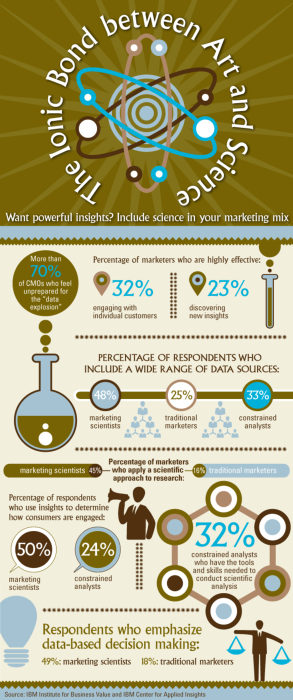Art and science may seem like polar opposites, but in the marketing world, both elements are needed to deliver an electrifying experience.
According to IBM Institute for Business Value‘s “From Stretched to Strengthened: Insights from the Global Chief Marketing Officer Study,” more than 70% of CMOs surveyed feel unprepared to manage this “data explosion.” In addition, according to IBM Center for Applied Insights‘ “Marketing Science: From Descriptive to Predictive” study, only 32% of the 358 marketers surveyed report that they are highly effective at engaging one-on-one with customers, and only 23% say that they’re highly effective at discovering new insights to generate business value.
So, IBM says it’s time to call in the professionals: marketing scientists. According to IBM, marketing scientists possess more analytical skills and have a more extensive scope of impact than their traditional marketer and constrained analyst (those with struggling, limited prescriptive analytics or a mostly internal scope) counterparts. For example, while 49% of marketing scientists stress the importance of data-based decision making, only 18% of traditional marketers emphasize the same. Likewise, while 50% of marketing scientists use insights to determine how customers are engaged, only 24% of constrained analysts admit to doing the same. And while traditional marketers and constrained analysts tend to have a narrower data focus, marketing scientists look at the company’s big picture. For example, 48% of marketing scientists use a wide-range of data sources, including blogs, social media, and government publications; only 33% of constrained analysts and only 25% of traditional marketers follow these same practices.
If traditional marketers and constrained analysts want to catch up, they’ll have to include science in their marketing mix. Forty-five percent of marketing scientists take a scientific approach to research, while only 16% of traditional marketers use a similar approach. Likewise, only 32% of constrained analysts say that they have the tools and skill sets needed to conduct scientific analysis, compared to 52% of marketing scientists.
We know you love infographics. Check out some more Direct Marketing News originals.








